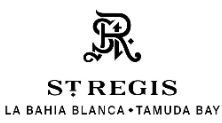
INTERVIEW - LAURENT DEMOULIN, GENERAL MANAGER, THE ST. REGIS LA BAHIA BLANCA RESORT TAMUDA BAY IN MOROCCO: "HELPING TO MOVE THE DESTINATION UPMARKET" (Maroc)
The General Manager of the new flagship hotel of the Marriott group in Morocco has embraced the dual challenge of opening a property and boosting tourism and the economy of his destination |
 |
INTERVIEW - LAURENT DEMOULIN, GENERAL MANAGER, THE ST. REGIS LA BAHIA BLANCA RESORT TAMUDA BAY IN MOROCCO: "HELPING TO MOVE THE DESTINATION UPMARKET" (Maroc)
The General Manager of the new flagship hotel of the Marriott group in Morocco has embraced the dual challenge of opening a property and boosting tourism and the economy of his destination |
Catégorie : Afrique Océan Indien - Maroc - Interviews et portraits
- Interviews - Les Leaders du secteur
Interview de Vanessa Guerrier-Buisine le 20-10-2023
 Laurent Demoulin, General Manager of the St. Regis La Bahia Blanca Resort Tamuda Bay Morocco
Crédit photo © Marriott International
Over a period of more than seven years, he developed his skills within the Méridien Hotels & Resorts group, culminating in the position of cluster director of revenue development & group sales. After a spell with the Pierre et Vacances group, he joined IHG Hotels & Resorts to maximize revenues from 150 hotels in the Greater China region. He decided to move to the Marriott group in 2012. It was a group that allowed him to develop to the full, first in revenue management, then by entrusting him with his first role as General Manager, at the Renaissance Paris Nobel Tour Eiffel hotel.
Far from the typical career path of the operational manager who becomes hotel general manager, Laurent Demoulin has cultivated his taste for financial performance during a career that has mainly focused on revenue management assignments. But the clichés of the office-based revenue manager are dismantled by the man himself. Fascinated by the quality of service in hotels, he shines above all through his experience in the field, scouring several countries a week, meeting the teams who help to fill the hotels daily. A penchant for developing the men and women in the hotel industry encouraged him to take a career turn.
In April 2023, Laurent Demoulin will embark on his first assignment as General Manager of a luxury Marriott hotel. By taking charge of the St.Regis La Bahia Blanca Resort Tamuda Bay, just a stone's throw from the Medina of Tétouan, he is adopting a new place to live, and new companions for adventure.
Designed like a private riad, the American group's first luxury hotel in Morocco boasts Moroccan-style spaces, all looking out onto the ever-present Mediterranean Sea. The hotel honours the codes of the St. Regis brand, with the emblematic St. Regis Bar, two restaurants, a spa, a library, 100 keys, and above all the butler service, the signature of St. Regis hotels, for an exceptional guest experience.
It's an exhilarating adventure, and the French director agreed to outline the details in an interview with the Journal des Palaces.
Journal des Palaces : Your career path is marked by a specialization in revenue management at group level. How does one go from this type of mission to the general management of a luxury property?
Laurent Demoulin: When I was managing revenue, I was already spending 80% of my time in the field, travelling to three or four countries a week. 80% of my work was about people, hiring and developing teams.
Over the years, I began to dream of a broader role, in which I could take full responsibility for the performance of a property. I was interested in other issues such as performance, of course, but also service quality, the stability of the teams, their commitment to their work, and so on. More and more regional leaders in their discipline are returning to operations and taking up general management positions. This is very typical of Marriott. Our current EMEA President was an accountant in a hotel in Austria at the start of his career. Often, over a period of 20, 30 or 40 years, you go from a salaried position in a hotel to a position in the top 10 in Europe or the world.
Did the Marriott Group support you in taking on these new responsibilities?
The group supported me with development plans. After two years of preparation, the vice-president at the time, Gitta Brückmann, offered me a position as general manager at the Renaissance Paris Nobel Tour Eiffel hotel, before I could join the luxury part of the group.
I was selected as General Manager of the St. Regis La Bahia Blanca Resort Tamuda Bay. It was a fantastic opportunity because it meant opening up a resort that I hadn't managed before, and it was abroad. Three great challenges, to be met in record time because I arrived in April and opened four or five months later.
There are values, standards, codes, and labels that are different from one brand to another. I went to train at the St Regis in Rome, which is an emblematic hotel for the brand, and I also joined the Marriott group's luxury academy.
Have you had any mentors during your career?
Two people helped me a lot. Michel Miserez, who was my Vice-President of Operations at Marriott for three years, put his trust in me. He always helped me to think, to question myself without judgement, and encouraged me to take the job.
The second is Bernard Granier, whom I met when he was Director of Hotels at Méridien France. I was responsible for group sales for the Méridien hotels in Paris, and the 1998 Football World Cup was not going well. So he gave me the responsibility of filling 2,000 rooms in less than four months, which I did quite well.Bernard Granier then offered me the opportunity to become revenue manager for the two Méridien hotels in Paris. He's been with me ever since, calling me every fortnight. I can talk to him very directly about anything.
These long-term friendships are critical to me.
What objectives have you set for your appointment to the St. Regis La Bahia Blanca Resort?
Our ambition is to be recognized as the most beautiful seaside resort in Morocco, and also to contribute to the upmarket positioning of the destination, as desired by His Majesty Mohamed VI, who resides near the hotel in summer. We are working with the authorities in the region and with other hotels, such as the Royal Mansour, which is also due to open shortly.
Our ambition is also to deseasonalise the destination, which can only be done with the expansion of the airports.
What is your definition and vision of luxury hotels?
It's about creating an unforgettable experience for each guest, whether it's emotional or visual. This is possible thanks to in-depth knowledge of our customers' needs and our ability to translate them into attentive, personalized service. This means training our teams to ask the right questions on arrival.
What special features and experiences set your hotel apart from others in its category in Morocco?
We have truly created experiences that combine timeless glamour and avant-garde spirit. We are committed to an uncompromising level of service. This is underpinned in particular by the St. Regis signature butler service, which takes care of, coordinates and is the privileged interlocutor of our guests during their stay. What also sets us apart is our human-scale spaces. Everything is warm and welcoming, with a sense of speed and calm. As soon as you step out of the car and arrive at the hotel, you feel drawn towards the sea because the rooms, meeting rooms and reception room all face the sea.
What's more, we have the most beautiful beach on Morocco's Mediterranean coast.
Morocco recently suffered a disaster with the earthquake. How are you showing your support?
We made commitments following the earthquake in Marrakech, with ANAPEC, the local employment agency. We are going to take on people with few or no qualifications in the kitchen and in technical positions. Furthermore, we will also be training 16-year-olds for several years so that they have jobs and can help their families.
Is recruitment a challenge in the region?
There is a move upmarket, but few luxury skills today. We are going to work with the hotel and tourism institute in Tangiers to train people in the years to come and prepare this new generation to work in luxury hotels, by developing skills, whether linguistic or in terms of attitude.
Moroccans are extraordinarily kind, but there are also codes that need to be understood and applied.
The development of the offer in the region has increased the number of employees from 300 in the winter to almost 2,500 in the summer. Managing seasonal staff alone is a real challenge.
How do you emphasize the importance of people in the hotel business? What kind of manager are you?
I put all my energy into sharing the pleasure with my teams, to create a positive dynamic so that everyone feels recognized and appreciated.
I spend time in the field, trying to listen, understand the issues and help my teams. Likewise, I truly enjoy teamwork and I tend to be a participative person. I'm also very demanding and expect everything to be perfect.
You play tennis at a high level. What virtues do you bring to sport in your professional life? How do you encourage your teams to excel?
In sport, we talk about discipline, endurance, and perseverance. This has helped me a lot to manage difficult periods, to find my balance with periods of recovery, by doing sport to evacuate.
To help my teams excel, I try to set an example and show my commitment to them. You have to give to receive, and that's the concept I try to apply. I leave space for the teams to take the initiative.
How did you choose your teams for this pre-opening event?
When I arrived, I stayed in a €30-a-night hotel, and I hired my HR manager two weeks later. She has 30 years' experience in the Moroccan luxury goods industry, so we decided to find our employees in Morocco.
We quickly found a building to rent and brought it up to Marriott Group standards to house the employees. On 11 June, when we held our open day for recruitment, 450 people were already there at 8am, and there were ten of us to welcome them. Some candidates came from Marrakech, which meant a 2-day bus journey to spend 5 to 10 minutes with each of us.
We chose them based on their solid experience in the luxury sector and in pre-opening mode. It's a very special time, and you have to be willing and able to work very hard, and deal with pressure and unforeseen events. Our second prerequisite was the need to speak at least French and English, and finally, their attitude, their desire to learn and to take risks.
85% of the employees who joined us are still with us today.
What should a young person starting out in the sector or a French professional know before considering an assignment in Morocco?
For a young person, it's trickier, particularly understanding that salaries here are not the same as in Europe. You have to appreciate cultural diversity, remain humble and adapt to others, not the other way around.
What advice would you give to a young person looking for a career in the luxury hotel sector?
First, you have to train well. I went to a hotel school and I think it's a good place to learn. Internships and apprenticeships are also good ways of putting into practice what you learn at school. Above all, you need to gain experience by working in different departments, in one or more hotels, whether luxury or not.
It's also important to speak two or three foreign languages to stand out from the crowd. And I'd say that working internationally and being flexible about destinations are assets if you want to grow quickly. I also encourage young people to take calculated risks in their careers.
You need to cultivate contacts with professionals and have a good network. I take part in conferences, which are great opportunities to meet people, and give you access to CEOs and others. This is advice that I have applied to myself.
 At the St. Regis La Bahia Blanca Resort Tamuda Bay Morocco are instantly soothed by the ever-present sea.
Crédit photo © Marriott International
 Crédit photo ©
 Life at the St. Regis La Bahia Blanca Resort Tamuda Bay is very relaxed and encourages guests to unwind.
Crédit photo © Marriott International
|
|






